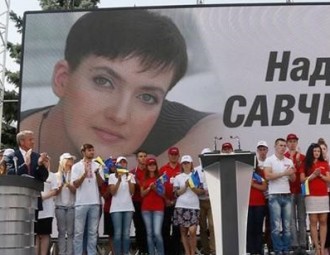Andrei Yahorau: Savchenko has become a major factor in Ukrainian politics
 blogs.korrespondent.net
blogs.korrespondent.net
And in the person of Savchenko Kremlin got a hostage, whom it can use in bargaining with Ukraine and the West.
It seemed that the trial of the Ukrainian pilot Nadzeya Savchenko has predictably stopped: the Ukrainian was sentenced to 22 years in prison on charges of murder of Russian journalists. And while the "Savchenko’s case" is obvious, Kremlin continues its game. In this game there is no place for Nadzeya Savchenko’s simple exchange to “simple” Russian captives; the pilot has become the Kremlin’s hostage that now can bargain with Ukraine and the West about the large-scale concessions.
This is the opinion of Andrei Yahorau, the head of the Center for European Transformation that he voiced in the commentary to the “EuroBelarus” Information Service when commenting upon the situation with Savchenko.
- Donetsk Court of Rostov region of Russia sentenced the Ukrainian pilot and deputy Nadzeya Savchenko to 22 years' imprisonment in a penal colony. Was it the ending of a wild story with kidnapping, transportation to Russia, the arrest, and “court” that the world expected?
- This ending is quite predictable - the whole theatre of absurd has been programmed by the political logics. Savchenko is not the object of justice and fair trial; she is the object of Russian propaganda machine in the information war against Ukraine. Basically, this is the main goal of "Savchenko’s case."
- The political nature of the process is obvious. What has Kremlin achieved by the conviction?
- By Savchenko’s example, Kremlin has launched the mechanism of accusations against Ukraine – in nationalism, turnover, fascism, inspiration of war – to the fullest. Savchenko has become the personification of evil, which Russia supposedly opposes by supporting the DPR and the LPR.
Besides, in the person of Savchenko Kremlin got a hostage, whom it can use in bargaining with Ukraine and the West – about the lifting of sanctions, liberalization of regimes, and obtaining various kinds of concessions.
- Poroshenko is ready to exchange Savchenko for captured Russian soldiers. Such opportunity has been voiced by the Special Representative of the OSCE Chairperson-in-Office in Ukraine by the OSCE Chairperson-in-Office Martin Sajdik after the Minsk meeting. How realistic is the scenario of exchange on equal terms? Or negotiations about the exchange might be delayed for numerous months?
- It seems to me that the Kremlin wouldn’t exchange Savchenko for unimportant or not very important people. Savchenko has a very high symbolic status; so for her, for a symbol, the Kremlin will ask much more than for a simple exchange of captives.
The situation is complicated by the fact that Savchenko is being held by Russia, who doesn’t think of herself as of the party to the conflict. Therefore, Minsk agreements supposedly have no direct relation to Russia, which means that the Minsk mechanism of "exchange of captives for captives" doesn’t formally affect Savchenko.
- What Moscow may demand from Ukraine in exchange for Savchenko? There were absolutely wild versions: for example, the demand to organize land corridor to Crimea.
- I think that it is these requirements that can be discussed. The Kremlin may ask anything in exchange for Savchenko.
Another thing is whether the Ukrainians are ready to go for this kind of exchange? I think that Ukraine will proceed from its national interests, and Savchenko is unlikely to agree to such unequal exchange.
- How will Savchenko’s story affect the Russia-Ukraine relations? Will the verdict become some kind of a turning point or not? Loud demands to break off diplomatic relations with Russia have been heard already. How far-reaching consequences can "Savchenko’s case" have?
- Ukraine just can’t break off diplomatic relations with Russia. The inner political process has become more complicated in Ukraine. It has become obvious that the Ukrainian revolution hasn’t led to Ukraine’s recovery from the chronic disease connected with the oligarchy and with a non-transparent policy in the country. In its turn, it delays the process of reforms, restructuring of the army, and the resolution of a number of other problems. Financial assistance could have been much bigger if Ukraine could demonstrate a transparent policy and anti-corruption actions. But Ukraine is unable to do any of these, which aggravates the country's dependence on Russia. Since Ukraine cannot quickly move towards normal reforms, it gets stuck in old patterns of economic and political dependence on Russia. This duality of Ukrainian policy doesn’t leave hopes for an early break off diplomatic relations with Russia.
Now Savchenko itself has become quite a serious factor, and her actions can strongly influence the events in Ukraine, the relations between Russia and Ukraine. Savchenko is a quite rough and decisive person. She has repeatedly demonstrated the ability to resume the hunger strike. Savchenko is able to put her own live at stake, thus defining the time span, during which her fate is to be decided.
As Savchenko is a symbolic figure, how will Ukrainians themselves react to the inactivity of the Ukrainian establishment? I think that this may trigger a new round of mass protests in Ukraine.
Savchenko herself is able to surprise us.
-
03.01
-
07.10
-
22.09
-
17.08
-
12.08
-
30.09








































